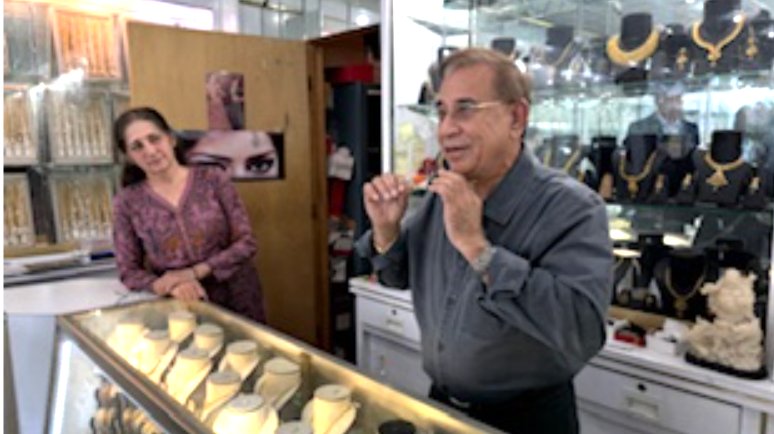From Iselin to India: What we learned about tariffs, trade and trust

It’s Diwali season – a five-day period in which Hindus around the world celebrate the centuries-old victory of light over darkness in the Indian subcontinent. But the colorful Diwali celebrations held annually in Indian-American communities across the United States are more muted this year than in the past. the reason? Prices of everything from sarees to spices have risen significantly since August 27. That was the day president Trump imposed 50% tariffs on goods imported from India.
The tariffs hit hundreds of South Asian-themed stores here in Iselin and in neighboring Edison, which together represent “Little India.” On a recent walk along the area’s Oak Tree Road (the subject of an Emmy-nominated documentary directed by Indian-American journalist Rohit Vyas and his daughter Aditi), shopkeepers shared their painful tales of the tariffs.
At a subzi mandi supermarket in South Asia, a manager says the store has become “empty” since the tariffs were imposed, with purchases of rice, flour, oil and pasta falling sharply. “People don’t shop the way they used to anymore,” he says, noting the store’s low traffic, with customers buying only what they need on a daily basis, and not in bulk.
The story is the same at Rima Jewelers, a retail store on Oak Tree Road. The owner, Ashok Sethi, has been in the business for over 30 years, and 90% of his customers are from India. He says the tariffs, which also contributed to the price of gold rising to more than $4,200 an ounce (up from $3,382 on Aug. 26), have led to price increases of about 40% at his store.
Buying gold is usually a Diwali tradition, but it has seen sales drop by 60% to 70%, as people lean towards individual pieces of jewelery rather than entire sets. When his customers look at something they want to buy, he says they are “absolutely amazed to see the new price.”
Tariffs have a real impact
The owner of Aanchal Saris shop in Iselin, Pradeep Sangari, told us that customs duties were particularly painful in the run-up to Diwali, the store’s busiest period. But the pain will continue after Diwali as well. Mr. Sangari sounds like a disciple of Milton Friedman, saying that “any time is not a good time” to impose tariffs.
New Jersey Gov. Phil Murphy, who just returned from his second trade mission to India, told us in a recent interview that he saw how the tariffs were “taking a real toll” on the Oak Tree Road business.
Mr. Sethi, the jeweler, said that if he could talk to President Trump, he would say: “Tariffs may seem like a quick fix, but they often hurt American consumers and small businesses. The real way to build strength is by investing in our people, our factories, and new technology so we can compete globally on quality.” He adds, “Our profit margins have diminished significantly. It is difficult for our business to continue.”
This challenge is escalating as major jewelery retailers in India, such as Tata-owned Tanishq, are opening stores on Oak Tree Road. These retailers do not have the long-standing relationships with or trust in the local community, which is key to Oak Tree Road’s success. One of us (Angela) is concerned about the long-term viability of the Indian grocery store where she takes her mother shopping.
The tariff story is not limited to Oak Tree Road. Angela has just returned from India after four weeks and met with business leaders, senior government officials and investors in six major cities. They talked about how the Indian economy has suffered from trade tensions with the United States — and how changes in the H-1B visa program are upending the plans of skilled Indians to find work in American companies. There has also been speculation about an attempt to de-risk by cutting investment in the US – an outcome that could harm both economies.
A deep crack, perhaps irreparable
There is an attempt to look on the bright side, as some Indians see these changes as slowing the “brain drain” to the United States. But there is also sadness about the deep rift – some call it “irreparable” – with a country that is home to nearly 4.5 million people of Indian descent (more than any other), and which for decades has been a beacon of hope and opportunity. It is a place where Indians have been able to prosper to the point where they have one of the highest household incomes ($151,200) of any ethnic group in the country.
Some of this wealth can be attributed to the success of Indians working in the technology industry. But it also stems from those who run small businesses — whether it’s a sari shop in Iselin or a hotel in Mississippi. These business owners contribute to the vitality of the American economy, while also working to strengthen ties to their ancestral homeland.
These ties of trade and kinship are only part of the reason why Antony Blinken, as Secretary of State, said the US-India relationship is “among the most important of any relationship in the world.”
Governor Murphy echoed this sentiment in our interview: “This is too important a relationship to have this go wrong…We belong together.” He put $500 million in tax incentives for India-based companies that create jobs in New Jersey because he saw the positive impact other companies – from HCLTech to TCS – had on his state.
Diwali is a time for celebration, but it is also a time for reflection – about how to overcome challenges and seize opportunities – and there are many of them now for Indians and Indian-Americans. The holiday also celebrates the centuries-old victory of knowledge over ignorance. What is needed now is a modern-day triumph of knowledge – one that ends taxes on immigrant businessmen and restores US-India relations to where they belong.
The opinions expressed in Fortune.com reviews are solely those of their authors and do not necessarily reflect the opinions or beliefs luck.
Don’t miss more hot News like this! Click here to discover the latest in Business news!
2025-10-18 13:10:00




